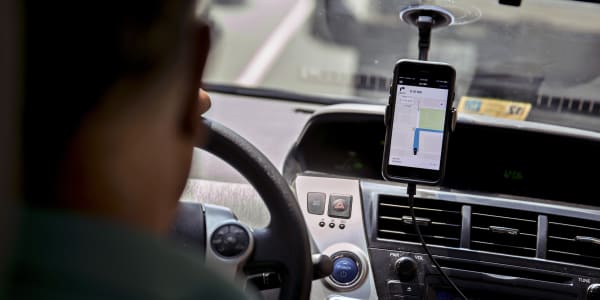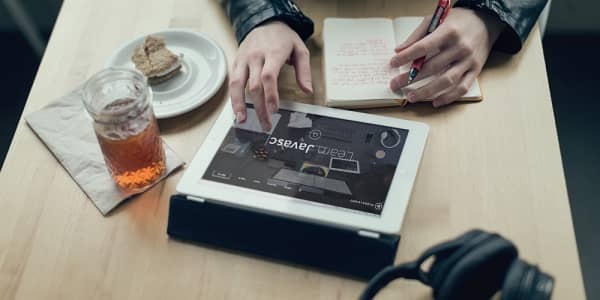
Walk the aisles of any store in any mall in America and you're almost certain to hear music coming from above. Consumers know the familiar background tunes colloquially as Muzak.
Of course, that experience is feeling more and more like a relic of the shopping past. Physical retail is deteriorating, malls are closing and the Muzak brand is dead. The upheaval has been plenty well documented.
Still, as the 2015 holiday season ramps up, music remains important to retailing, even as the way we browse and buy evolves. With commerce going digital and consumers glued to their smartphones, brands are trying to recreate the Muzak experience on their new most valuable real estate: mobile apps.
It's the latest tool that stores are employing to stand out in the crowded mobile commerce world, where consumers are inundated with apps that get deleted as quickly as they're added.
American Eagle Outfitters, a 38-year-old company that operates more than 1,000 stores, has upgraded its mobile experience with music to promote browsing, user engagement and a loyal following.
Since American Eagle added a streaming service to its mobile app in July, consumers who pushed play spent more than triple the amount of time on the app as those who didn't, while the number of users who returned within 30 days doubled. That all adds up to a pop in sales.
"We knew that our customers would love listening to our playlists, but what is really exciting from a business standpoint is that they hang out in the app longer and shop more as well," said Chad Kessler, global brand president at Pittsburgh-based American Eagle.
Brands have no choice but to chase eyeballs. Mobile retail revenue in the U.S. next year is expected to jump 28 percent to $96.2 billion, according to eMarketer. It's still early days, as that only represents 1.9 percent of total retail sales.
But the trend is clear. Shopping, especially among the younger generations, is happening on devices, so that's where retailers are experimenting with music. According to new research from online coupon service Ebates, 54 percent of Americans are planning to browse for gifts from their mobile phones this holiday season, and 24 percent will make purchases that way.
While some companies are installing their own music player, American Eagle's service is provided by Feed.fm, a six-person software start-up that operates out of a retail-focused co-working space in San Francisco's Westfield mall.
Feed is betting that music will be a default feature on retailers' apps. And unlike Muzak, which used instrumental, rerecorded versions of songs, Feed is providing real tunes from real artists with playlists curated by the brands. Plus, listeners can provide a thumbs-up or thumbs-down to a song, helping Feed understand a consumer's tastes and adapt the stream accordingly.
Other brands using Feed's player in some capacity include Bud Light, Tommy Bahama and customized T-shirt provider YoShirt. They employ it in different ways, sometimes within an app, and in other cases on a mobile website or Facebook page.
Feed is in talks with about 40 additional retailers, said co-founder and CEO Jeff Yasuda. Feed is also building out integrations that combine music with shoppable content on Instagram.
"We work in a mall and there's not a single brick and mortar retail store here that doesn't have music cranking out of it," said Yasuda. "We're taking that concept to the online world where you can track it and see demonstrable data around lift, session times, retention and most importantly conversions."
Feed sits at a tough intersection in business. Traditional retailers are clawing to keep pace with e-commerce, particularly Amazon.com's effort to sell everything at the greatest convenience and cheapest price. And digital music has always been a challenge, largely because of the high costs associated with licensing songs.
Just last month, Rdio sold to Pandora for $75 million, but not before declaring bankruptcy amid more than $200 million in debt. Then there's Muzak, which went bankrupt in 2009 and was purchased two years later by Mood Media.
Yasuda was part of the struggle. He spent more than a half-decade trying and failing to crack the consumer music market with earlier companies Fuzz and Blip.fm, before going the route of selling technology to businesses. He calls Feed's offering music as a service (MaaS), playing on the hot trend of software as a service (SaaS).
Feed charges customers a monthly fee and then makes additional money based on how many consumers push play while browsing. The goal is to create a better shopping experience and help convert browsers to buyers.
But Feed still has to deal with the music industry.
Like Pandora, Feed is required to pay artists and publishers for streaming rights. Even before introducing its current product, Yasuda's consumer businesses spent years building a music engine that not only learns about consumer tastes and makes recommendations but also complies with all the royalty and streaming laws. For retailers trying to do digital music themselves, those are a lot of hurdles to get over.
"They handle that complex world for us so we can just pick great songs and have fun with the music," said Kessler.
Or as Yasuda describes it, "there is significant brain damage around trying to figure all this stuff out."
A big part of Yasuda's strategy is to move the conversation away from music and towards content, specifically the fast-growing business of content marketing. Rather than spending money on the usual brand promotion and banner ads, companies are investing in unique branded stories, slideshows and videos that draw in consumers and inspire them to share the content with friends.
That's especially important for retailers at risk of losing business as mobile shopping shifts to platforms like Facebook, Instagram, Pinterest and Twitter.
PQ Media expects global revenue from content marketing to increase 15 percent a year and top $50 billion by 2019.
The potential to grab a greater slice of that market helped Feed raise $2.7 million from investors including Crunchfund, Fyrfly Venture Partners and Core Ventures Group.
"It's taken the market a while to come to them, but now they have a couple top-tier branded accounts that are willing to share some of their statistics," said Joanna Drake Earl, a partner at Core Ventures in San Francisco and previously the operating chief of Current TV. "They should see a lot of new customers signing up."










